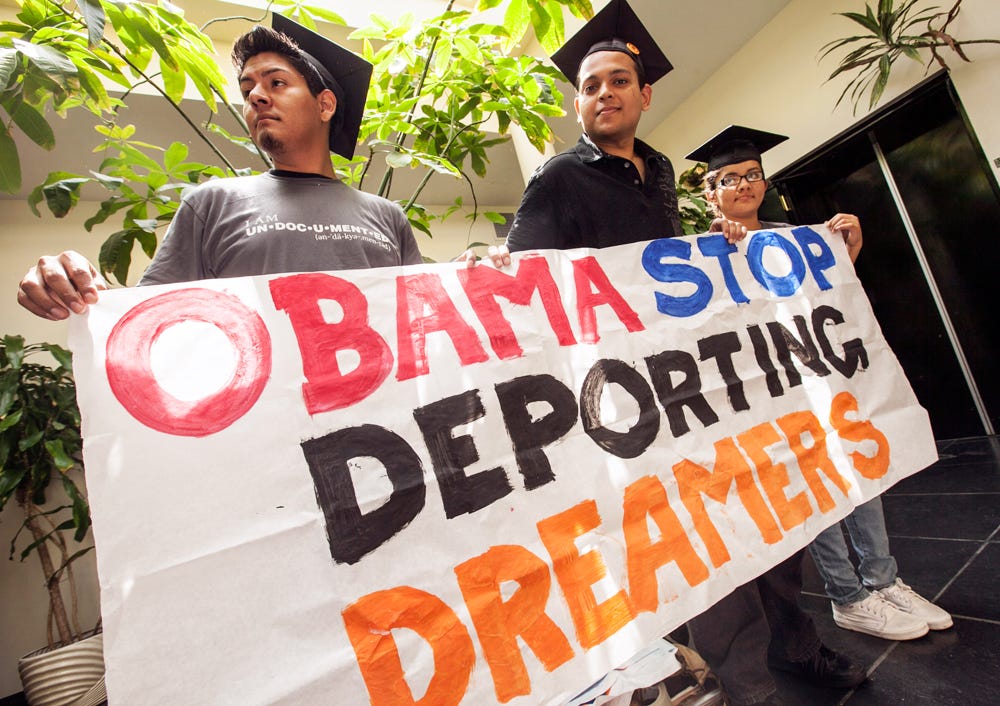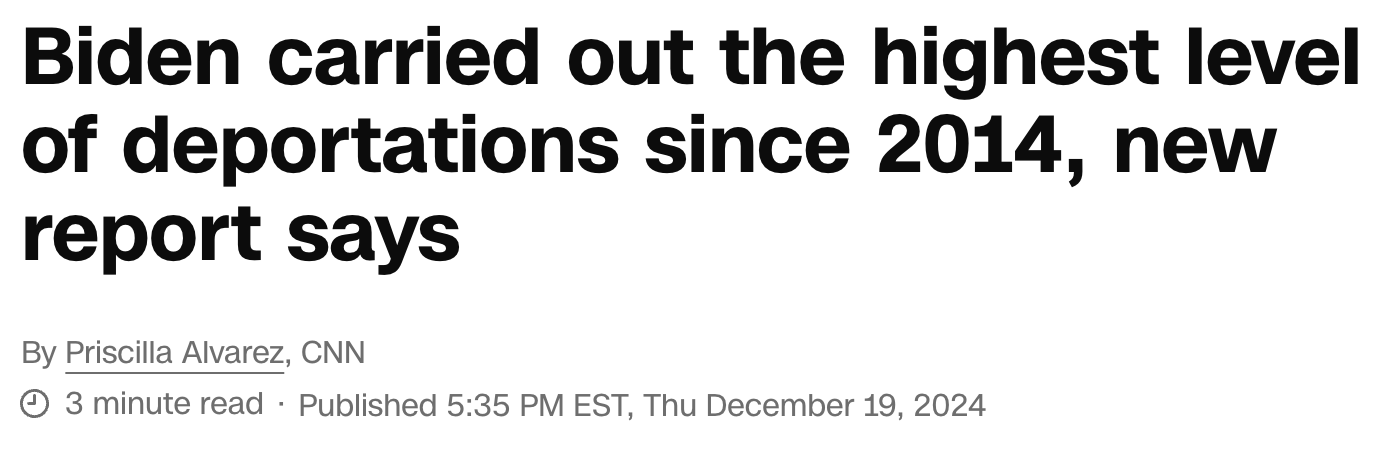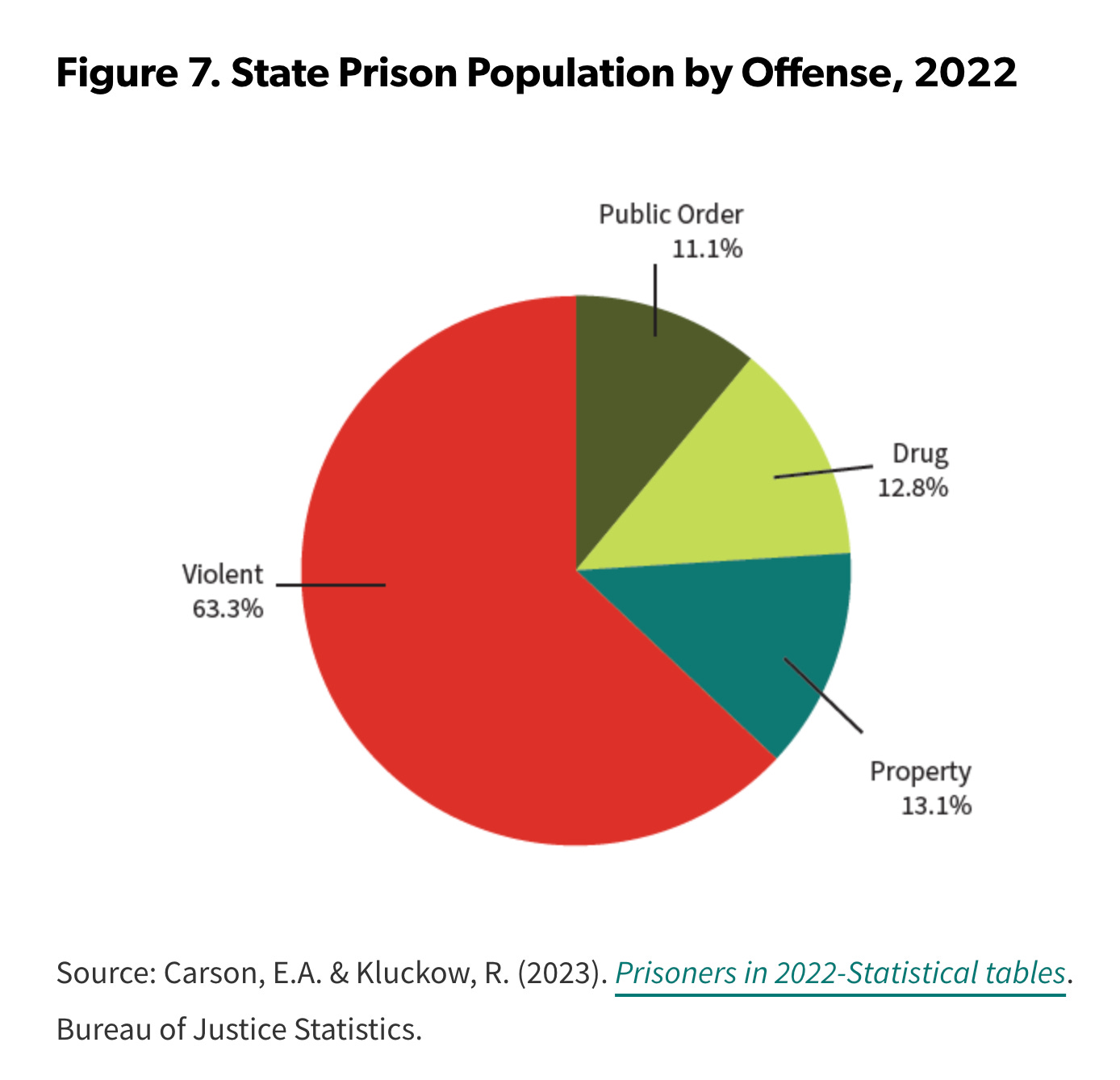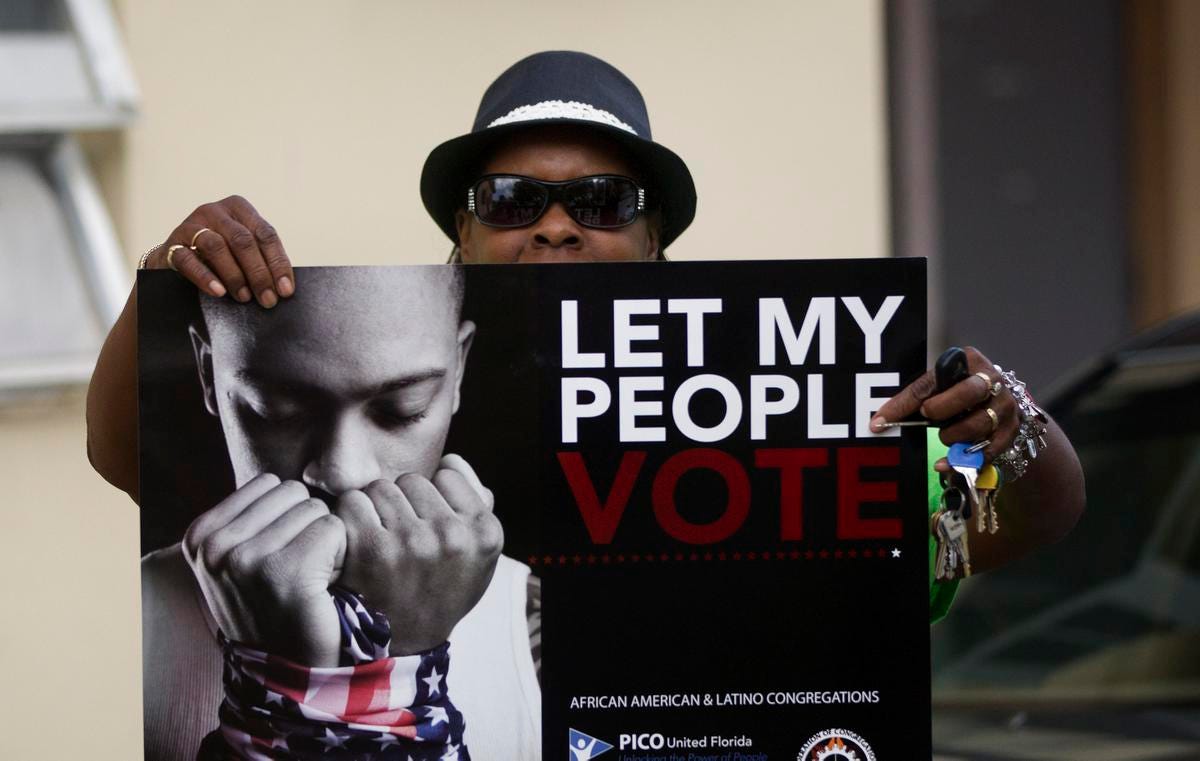Democrats, Don’t Do Trump’s Work for Him
Only 8 Senate Democrats voted against advancing MAGA's immigration bill.
When I was 23 years old, I was very tangentially involved as a volunteer in a 2013-14 grassroots campaign in Philadelphia to stop police from automatically transferring undocumented immigrants to Immigration and Customs Enforcement (ICE) under a program known as 287(g). During Obama’s presidency, local organizers saw a stark disconnect between Washington’s lofty promises of comprehensive immigration reform and the urgent need to dismantle the machinery of mass deportation. This was the era when the GOP’s relentless obstruction of reform, combined with immigration’s status as a “third rail” for many swing-state Democrats, forced advocates to settle for imperfect fixes to prevent the skyrocketing number of deportations. Measures like DACA and policies aimed at curbing ICE’s most destructive practices—racial profiling, workplace raids, and family separations—became the patchwork solutions to a broken system that federal politics couldn’t fully address.
Programs like 287(g) fueled this system by encouraging workplace raids, racial profiling, stop-and-frisk, and over-policing of minor infractions, targeting working class immigrants (often restaurant workers, farmers, day laborers, cleaners, and health care aides) in the same way that law enforcement has disproportionately targeted Black and brown Americans for decades. Once in custody, immigrants were funneled into detention facilities under ICE contracts, often without being convicted or even charged with a crime.
For many of the core organizers in Philadelphia, the fight wasn’t just about immigration policy—it was about dismantling a system that relied on the same tactics and policies driving the United States to become the world leader in incarceration. Immigrant communities shared their stories of how minor interactions with the police—traffic stops, jaywalking, even calling the police for help—could lead to deportation. The campaign made it clear that 287(g) didn’t make communities safer; it made neighborhoods more afraid, undermining trust between residents and law enforcement.
The organizers eventually won and Philadelphia became one of the first major cities to cut ties with 287(g), disentangling local policing from federal immigration enforcement. Nearly a decade later, as Republicans persist in blocking immigration reform, it feels as though we’re sliding backward.
After a bruising election, Democrats, anxious to avoid being labeled soft on crime and immigration, are backing the cynically named Laken Riley Act. The bill uses the tragic story of a young woman murdered as cover for policies that do nothing to prevent such tragedies but everything to expand the far-right’s war on immigrants and deepen America’s place as the maintaining the largest prison and detention system in the world. It mandates indefinite detention for immigrants accused—but not convicted—of minor offenses like shoplifting, sweeping even those ultimately found innocent into a dragnet of mass detention.
The Laken Riley Act accelerates deportations by allowing undocumented immigrants to be detained and subjected to removal proceedings for minor offenses, even without a conviction, bypassing due process protections. Even more alarming, the bill hands unprecedented power to anti-immigrant state officials like Texas Attorney General Ken Paxton, allowing them to sue the federal government to detain asylum seekers or even block visas for immigrants from countries deemed “uncooperative.” By mandating detention for petty infractions and empowering state attorneys general to enforce immigration laws, it creates a fast-track pipeline for mass deportation. It’s a policy that would unravel constitutional protections and wreak havoc on industries reliant on immigrant labor—all while leaving actual threats to public safety unaddressed.
Democrats have long positioned themselves as the bulwark against the authoritarian impulses of Donald Trump, warning of his erosion of democratic norms, his weaponization of bigotry and fear, and his consolidation of power. Yet, by supporting the Laken Riley Act—a bill that aligns seamlessly with Trump’s mass deportation agenda—they risk entrenching the very systems they once decried. Of the 47 Senate Democrats, 37 voted to advance the legislation, a move that neither enhances public safety nor addresses the failings of our immigration system.
The Laken Riley Act is more than a misguided policy; it’s a quiet capitulation to far-right demagoguery. Rather than articulating a principled case for keeping families together while preserving public safety, Democrats are retreating into the flawed belief that adopting pieces of the MAGA agenda is the way to neutralize its appeal. This strategy—endorsed by figures like John Fetterman and Tom Suozzi—assumes that co-opting Trumpist rhetoric and policies will inoculate Democrats against attacks. But in practice, it does the opposite, lending credibility to the politics they should be dismantling with their own arguments. This isn’t just incoherence; it’s a symptom of a deeper crisis, a Democratic Party liberalism adrift, searching for purpose while conceding ground it once claimed to hold firm.
At a moment when Trump and his allies are poised to escalate their assault on democratic norms and exploit divisive scapegoating, Democrats should be presenting a unified and principled opposition. Instead, they’ve been fractured by one of the oldest and most insidious strategies in history: “outsiders are a threat to our safety and our women.” If Democrats understand Trump as a far-right authoritarian, even a fascist, whose strategy hinges on scapegoating and division to centralize state power, suppress dissent, and subordinate individual rights to the dominance of a select group, why would we grant him a significant political victory?
According to Senate aides who spoke to Greg Sargent, swing state Senators John Fetterman and Ruben Gallego frustrated their Democratic colleagues by hastily endorsing the Laken Riley Act without emphasizing its serious flaws, potentially undermining even last-ditch efforts to amend the bill. Their misleading claims about the bill’s necessity and provisions not only bolstered MAGA’s case but also made it allegedly harder for Senate Democrats to present a coordinated response or extract meaningful changes. For example, the Laken Riley Act insists that even if charges are dropped or innocence is proven, the accused can still face indefinite detention. The taxpayers will pay for it all, funding the locking up of people who may have done nothing wrong.
When immigration legislation claims to narrowly target "criminal aliens," the reality is far messier and far more destructive. Take Maria Sanchez, a 63-year-old grandmother and legal permanent resident who nearly lost her right to remain in the U.S. after a decades-old drug conviction for cultivating a small amount of marijuana. Her case wasn’t unique. Between 2007 and 2012, the government deported more than 34,000 people for marijuana possession, many of them legal residents like Sanchez. These are not the drug kingpins we’re told these laws are meant to address. These are neighbors, parents, and workers caught in the net of a system that treats every infraction—no matter how small or how old—as a reason to expel someone from the country.
The same pattern emerges across the country. President Obama’s mantra of “deporting felons, not families” was meant to reassure Americans that enforcement would target only the most dangerous individuals. But by the end of his first term, less than 11% of deportation orders were for people convicted of violent crimes. Instead, individuals like Jose Alvarez—who had lived in the U.S. for 40 years, raised six children who are all U.S. citizens, and made one mistake decades ago—found themselves deported for nonviolent offenses. In Alvarez’s case, it was a drug charge from 1995, a conviction for which he served his time and rebuilt his life. Yet, when pulled over for a broken taillight in 2020, Alvarez was handed over to ICE and deported without a chance to say goodbye to his family. His story illustrates how these laws don’t just target people with recent convictions—they reach back years, even decades, ensnaring people who have long since served their sentences and moved on.
And here’s the more challenging political reality: Advocates for criminal justice reform have long argued that reducing the United States’ status as the world’s leader in incarceration requires addressing more than just nonviolent drug offenses. The majority of people in prison are not there for marijuana possession or sale, but for a broader range of crimes with lengthy sentences that must also be part of the conversation. In 2022, over 63% of individuals sentenced to state prison were convicted of violent crimes—a significant increase from 1970, when only 30% of those incarcerated had been convicted of violent offenses.
Why do I bring this up? Many legal and social service organizations advocating for the subset of working-class undocumented immigrants entangled in the criminal justice system lent their support to the campaign in Philadelphia. After college, I worked at one of these organizations, an experience that profoundly shaped my views on crime and punishment. Over the course of a year, I met dozens of undocumented, working class immigrants (often people of indigenous heritage) who found a member of their family facing deportation after interactions with local police—incidents ranging from being charged for failing to stop at a stop sign, stealing shampoo from a Target, or driving after a few beers following a 12-hour day labor shift, to more serious allegations like domestic violence–cases where women often found themselves pleading with federal authorities, explaining they had forgiven their partner and didn’t want to see them deported.
For social workers assisting undocumented immigrants accused of crimes, the fight against 287(g) was inseparable from their understanding of mass incarceration and structural drivers of poverty, systemic neglect, and crime. They recognized that the criminal justice system already provided mechanisms for accountability, however flawed. So why would we triple down on policies that bypassed due process—separating families and destabilizing communities by funneling individuals into deportation immediately after police interactions, often without trial or conviction?
This effectively turns immigration policy into an extension of America’s sprawling system of mass incarceration—a system Democrats once pledged to challenge but now seem to have quietly surrendered to, retreating from most meaningful efforts at reform. The politics are indeed hard, but the party claiming to oppose Trumpism looks more like it's surrendering than even attempting to make a case.
Over the past decade, the United States underwent a revolution in how it treats people who have been entangled in the criminal justice system. We’ve restored voting rights to millions of felons, recognizing that civic participation is a fundamental right that cannot be denied without undermining democracy itself. Removing questions about criminal records from job applications acknowledges that economic opportunity is key to reintegration and that those who have served their time deserve a fair chance to rebuild their lives without enduring endless punishment. These shifts reflect a broader understanding that many crimes stem from systemic inequality—cycles of poverty, violence, systemic racism, and lack of opportunity—and that redemption and reinvention are possible.
Since the pandemic and backlash to Black Lives Matter, many Americans and their elected officials have retreated from the push to change the world’s largest system of incarceration and detention. Meanwhile, this quiet revolution had largely excluded immigrants, who are often caught up in the same structural forces. It's no secret that winning over public opinion to empathize with those charged with crimes is a challenging political endeavor. Yet, over the past decade, significant progress has been made in shifting attitudes and fostering a more nuanced understanding of justice and accountability.
We’ve retreated from the essential work of mobilizing our base, amplifying the voices of directly impacted families, sharing their stories to persuade the middle, and strategically isolating the opposition.
Far from enhancing public safety, policies like the Laken Riley Act undermine it. They erode trust in law enforcement, as immigrants fear that any interaction with police could lead to deportation. They destabilize families and communities, often separating breadwinners and caretakers from their loved ones. They perpetuate a narrative that most immigrants are criminals even though the data tells a very different story. And they contribute to the expansion of what is already the largest incarceration and detention system in the world. These laws aren’t about public safety; they’re about politics—driven by a far-right strategy of division and control.
The Laken Riley Act also overlooks a truth as old as humanity itself: migration is not an anomaly but a constant, driven by the universal quest for safety, opportunity, and a better future. Equally constant, it seems, is the backlash to newcomers—a reaction history so often condemns in hindsight. Democrats need an immigration argument that reflects the complexities of public safety, economic growth and fairness, and the dignity of human movement—one that acknowledges the realities of a 21st-century world shaped by global migration.
As the Republican Party entrenches itself as a nativist force and Democrats remain tied to a coalition rooted in cosmopolitanism and diversity, our party must sharpen its messaging and strategy. Progressives, in particular, must craft clear, compelling arguments that recenter the human beings caught in the middle and counteract the default narrative portraying us as advocates of "open borders," indifferent to American workers, and lacking a concrete plan for addressing concerns related to crime or public safety.
For over a decade, Republicans have filibustered 11 million undocumented Americans into oblivion while weaponizing immigration leaning on the oldest authoritarian tactic: stoking fear of outsiders to gain power. The Laken Riley Act lays bare the quiet erosion of Democratic liberalism—a politics once defined by principle in Trump’s first term, now shaped by some conviction that the country must hate us, immigrants, or all of the above.
By embracing a bill steeped in punitive excess, Democrats risk legitimizing the far-right authoritarian impulses they claim to oppose, trading justice for a hollow sense of pragmatism. This isn’t merely a policy misstep; it’s a sign of a deeper unraveling—a party that has forgotten how to contest media narratives, build coalitions, or wield power as a tool for freedom. Lacking social movements or an ideological framework to anchor them, Democrats risk becoming enablers of the very forces they claim to oppose, mistaking accommodation for strategy.
Losing is one thing; surrendering without a fight is a strategic disaster. If legislative defeat is inevitable, it must be in defense of our values—not in enabling the far-right’s rise. Our politics may need less antagonism, but it surely needs some agonism.











If in fact, Due Process is thwarted by the #RileyLakeAct then it stands in violation of the #5thAmendment and #14thAmendment and is #Unconstitutional. Some are going to try to say, "they aren't citizens", to which we have to reply that Constitutional law was based on simply being a person.
This mindset that "illegals are aliens and not human" is absurd. This thinking would be void to the humanitarian thrust of the US Constitution. We have a serious problem when othering of people in this nation casts them as not being protected by our laws. #NoHumanIsIllegal
Great article. I’m lucky that I’m working with a third party who also does GOTV for Democrats so I don’t have to constantly watch them capitulate. I just don’t know how many of them will stand up to Trump without a massive fight on our part. They act like Trump won like Obama did in his first term and he didn’t. We desperately need a party who will fight fascism - but don’t think the Democrats are up to it. They need people like you to call them out and show us what we should be pushing harder for.